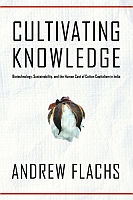Cultivating Knowledge
Biotechnology, Sustainability, and the Human Cost of Cotton Capitalism in India
Author(s)
Flachs, Andrew
Collection
Knowledge Unlatched (KU)Language
EnglishAbstract
A single seed is more than just the promise of a plant. In rural south India, seeds represent diverging paths toward a sustainable livelihood. Development programs and global agribusiness promote genetically modified seeds and organic certification as a path toward more sustainable cotton production, but these solutions mask a complex web of economic, social, political, and ecological issues that may have consequences as dire as death.
In Cultivating Knowledge anthropologist Andrew Flachs shows how rural farmers come to plant genetically modified or certified organic cotton, sometimes during moments of agrarian crisis. Interweaving ethnographic detail, discussions of ecological knowledge, and deep history, Flachs uncovers the unintended consequences of new technologies, which offer great benefits to some—but at others’ expense. Flachs shows that farmers do not make simple cost-benefit analyses when evaluating new technologies and options. Their evaluation of development is a complex and shifting calculation of social meaning, performance, economics, and personal aspiration. Only by understanding this complicated nexus can we begin to understand sustainable agriculture.
By comparing the experiences of farmers engaged with these mutually exclusive visions for the future of agriculture, Cultivating Knowledge investigates the human responses to global agrarian change. It illuminates the local impact of global changes: the slow, persistent dangers of pesticides, inequalities in rural life, the aspirations of people who grow fibers sent around the world, the place of ecological knowledge in modern agriculture, and even the complex threat of suicide. It all begins with a seed.
Keywords
Social Science; Sociology; Rural; Social Science; Social Science; Anthropology; Cultural & SocialISBN
9780816543427Publisher
University of Arizona PressPublisher website
https://uapress.arizona.edu/Publication date and place
2021Imprint
University of Arizona PressClassification
Rural communities
Society and culture: general
Social and cultural anthropology


 Download
Download